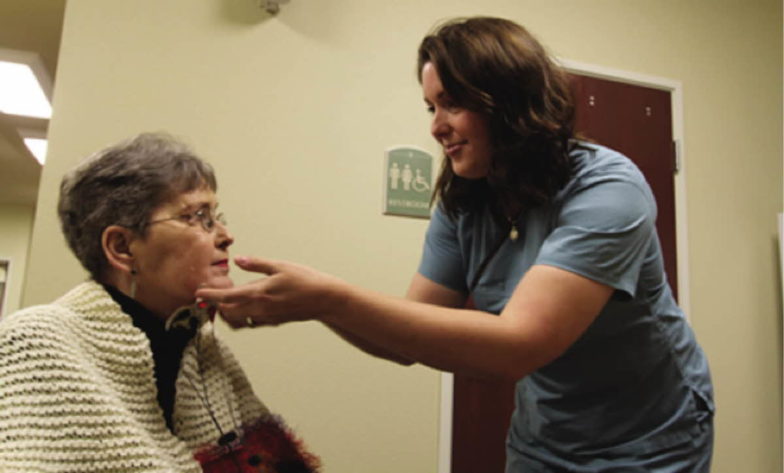Dysphagia’s impact on respiratory care

Licensed speech-language pathologist discusses evolving priorities, protocols and care plans for a growing number of dysphagia patients
By Medline Newsroom Staff | June 9, 2021
Dysphagia, or difficulty swallowing, impacts up to 70% of nursing home residents. And cases are increasing, due to a rise in the number of patients diagnosed with neurological diseases, a leading cause of dysphagia. Additionally, dysphagia has also been prevalent in ICU patients with COVID-19 respiratory issues.
“Even before the COVID-19 pandemic, healthcare providers have been updating clinical protocols for respiratory care patients, who are among the most likely to be re-hospitalized in the U.S. It is critical that we proactively identify, monitor and treat these patients before they are hospitalized,” said Dr. David Hutchings, a licensed speech-language pathologist and chief operations officer of Spectramed, a leading provider of electrotherapy and education courses with a focus on dysphagia.
As Medline announces its exclusive collaboration with Spectramed to optimize patient outcomes around the treatment of dysphagia, the Medline Newsroom spoke with Dr. Hutchings on how these new protocols are impacting the role of speech-language pathologists and how the increase in dysphagia patients will influence the industry’s approach to care plans.
Newsroom: How has the increase in reported dysphagia numbers influenced how the industry approaches respiratory care plans?
Dr. Hutchings: We know that a patient who has a compromised respiratory cycle will have disrupted swallowing, placing them at greater risk for respiratory infection. We see some physiological differences in these patients. Normal swallowing is a sequence of swallow then breathe. It is the opposite in this patient population. They swallow then inhale, placing them at a significant risk for infection, aspiration and obstruction. The impact on the industry will lead to clinical protocols that are not clinically reactive, but rather predictors that trigger the clinical need. For example, the Outcomes and Assessment Information Set (OASIS) for home health care indicates, “with minimal exertion (e.g., while eating, talking or performing other ADLs) or with agitation.” This assessment question should trigger a dysphagia assessment due to dyspnea with intake. Clinical protocols must be developed in healthcare organizations to help evaluating clinicians identify the clinical need of these patients.
Newsroom: How is this evolving the role speech-language pathologists play in patient recovery?
Dr. Hutchings: More healthcare providers are taking a proactive approach to patient care outcomes by considering a broader range of diagnoses that may indicate the need for speech pathology, increasing demand for speech-language pathologists. Dysphagia and aspiration are great examples of this. Aspiration is one symptom of dysphagia, which can also cause weight loss, dehydration and malnutrition. Any time a provider can intervene early, preventing hospitalizations, they are part of the solution to an overall healthcare problem that impacts the entire body.
Also, due to the large baby boomer population and the care needs associated with growing older, employment for this job sector is projected to grow 25 percent from 2019 to 2029, much faster than the average for all occupations. It is essential for leadership to consider how they’re engaging with staff. Consider what tools they can invest in to aid in more efficient, high-quality treatment for patients, as well as education that will help drive caregiver empowerment.
Newsroom: What type of training or tools do you think leaders need to consider to ensure speech-language pathologists can continue providing high quality care?
Dr. Hutchings: Investment in advanced training demonstrates commitment in clinicians by providing them with the most current clinical approaches. Organizational leaders should focus on clinical trainings that are patient centered and based on the clinical needs of the patient and their condition to help prevent decline in health and hospitalization. Spectramed provides education through its program called The Guardian Way® that takes a customized approach to patient care. The Guardian Way focuses on empowering and educating caregivers on all the ways that dysphagia can impact a patient, while providing clinical protocols that are individually tailored for each patient. No matter what education program is implemented, it is important that it be centered on outcomes. How those outcomes are identified will be based on clinical care and organizational goals.
Medline and Spectramed are now exclusively partnering to sell Spectramed’s dysphagia therapy devices that utilize neuromuscular electrical stimulation (NMES) and surface electromyography (sEMG) to help individualize treatment for patients.
Learn more about Medline’s customized therapy solutions.
Medline Newsroom Staff
Medline Newsroom Staff
Medline's newsroom staff researches and reports on the latest news and trends in healthcare.
